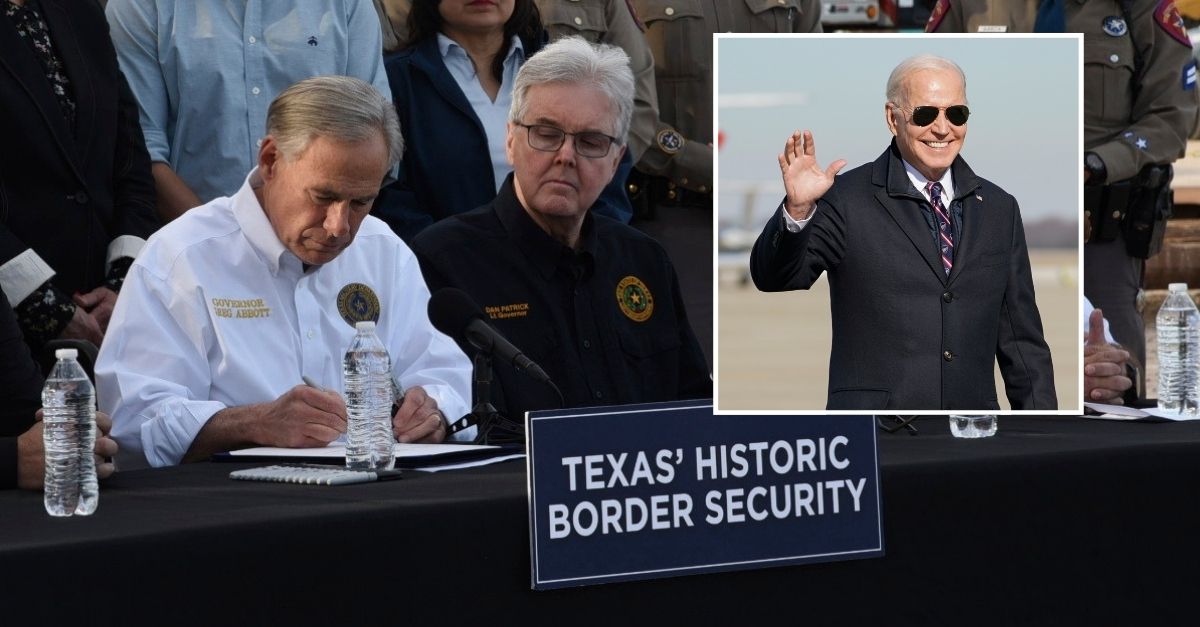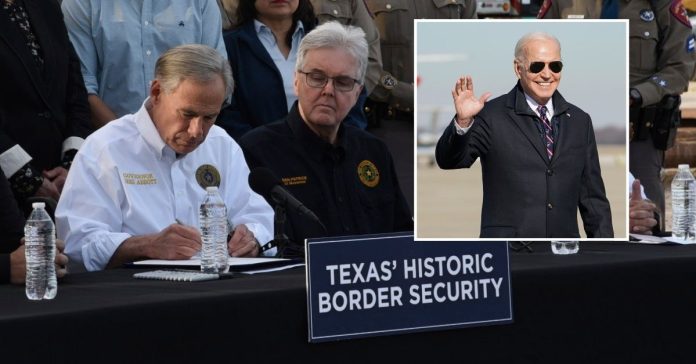
Main: Texas Gov. Greg Abbott signs three bills into law at a border wall construction site in Brownsville, Texas, Dec. 18, 2023 (AP Photo/Valerie Gonzalez, File); Inset:
President Joe Biden walks to board Air Force One at Andrews Air Force Base, Md., Friday, Jan. 5, 2024.(AP Photo/Stephanie Scarbrough)
A Ronald Reagan-appointed federal judge on Thursday blocked Texas from enforcing SB 4, a bill Gov. Greg Abbott (R) signed late last year to effect state arrests and deportations of undocumented border crossers regardless of the Biden administration’s enforcement priorities and the Supremacy Clause of the Constitution.
Senior U.S. District Judge David Alan Ezra, sitting on the U.S. District Court for the Western District of Texas and siding with the nonprofit legal group plaintiffs Las Americas and American Gateways, began his order by writing “several factors” led him to conclude that a preliminary injunction blocking Abbott, the Texas Department of Public Safety’s Steven McCraw, and El Paso County DA Bill Hicks from enforcing SB 4 was needed. The judge wrote that Texas is not at war and the state’s assertion that an active “invasion” is afoot is unsupported by the Constitution.
“First, the Supremacy Clause and Supreme Court precedent affirm that states may not exercise immigration enforcement power except as authorized by the federal government. Second, SB 4 conflicts with key provisions of federal immigration law, to the detriment of the United States’ foreign relations and treaty obligations. Third, surges in immigration do not constitute an ‘invasion’ within the meaning of the Constitution, nor is Texas engaging in war by enforcing SB 4,” Ezra said. “Finally, to allow Texas to permanently supersede federal directives on the basis of an invasion would amount to nullification of federal law and authority—a notion that is antithetical to the Constitution and has been unequivocally rejected by federal courts since the Civil War.”
In December, Gov. Abbott signed and touted three bills, one of which made “illegal entry into this state from a foreign nation” a Texas misdemeanor. From his announcement:
Senate Bill 4 from Special Session #3 (Flores/Guillen) creates a mandatory ten-year minimum prison sentence for smuggling of persons and continuous smuggling of persons. Passed with bipartisan support, the law enhances the criminal penalties for the operation of a stash house and creates a mandatory five-year minimum prison sentence. It also further enhances criminal penalties for victim-related offenses that occurred during the commission of smuggling, such as assault and burglary.
Senate Bill 3 from Special Session #4 (Huffman/Jetton) appropriates $1.54 billion in general revenue to the Trusteed Programs within the Office of the Governor for border security operations and the construction, operation, and maintenance of border barrier infrastructure.
Senate Bill 4 from Special Session #4 (Perry/Spiller) creates a criminal offense for illegal entry into this state from a foreign nation. The law cracks down on repeated attempts to enter Texas by creating the offense of illegal reentry and penalizes offenders with up to 20 years in prison. It also provides the mechanism to order an offender to return to the foreign nation from which the person entered or attempted to enter this state. The law provides civil immunity and indemnification for local and state government officials, employees, and contractors for lawsuits resulting from the enforcement of these provisions.
The third bill referenced above did not just authorize state arrests. It also made repeat offenses felonies, authorized the state to deport offenders, and immunized state actors from the consequences of enforcement.
On Thursday, Ezra found that Texas’ self-appointment as the immigration authority is plainly undercut by Supreme Court precedent.
“SB 4 directly challenges the federal government’s long-held power to control immigration, naturalization, and removal. SB 4 extends federal immigration penalties by authorizing Texas state officials to detain, arrest, prosecute, and remove noncitizens without federal supervision,” the judge wrote. “Supreme Court precedent squarely holds that SB 4’s attempt to regulate the unlawful entry of noncitizens is field preempted.”
At one part of the 114-page order, the judge addressed Texas’ claims that it was left with no choice because President Joe Biden and his administration have, as the jurist put it, “abandoned the field” of immigration. Ezra said it’s not that simple, noting that “Congress has also made clear it occupies the field.”
“Although Texas claims that the Biden Administration has abandoned the field, Congress has vested DHS and other executive agencies with substantial enforcement power and duties,” he wrote, tacking on a footnote namechecking Congress’ role (see also): “Throughout its briefing, Texas faults only the Executive Branch for abandoning the field of immigration. But congressional regulation of a field is far more relevant to preemption, or else the preemption analysis would constantly fluctuate depending on an agency’s or administration’s enforcement priorities.”
Beyond that, Texas’ argument that the Biden administration is engaging in “abandonment” at the border doesn’t square with the “hundreds of thousands of removals” DHS reported between May and November.
The judge said that while he was “sympathetic to Texas’s concerns at the border,” it is “simply not accurate to say that hundreds of thousands of removals constitute abandonment.”
“Texas mistakes the figurative for the literal. Whatever hyperbole Texas employs, DHS’s actions do not constitute genuine abandonment as a legal determination. Texas may disagree with the number of removals or the way that DHS goes about immigration enforcement, but it cannot legitimately maintain that DHS does nothing at the southwest border,” Ezra said.
Given that Texas is “not likely to succeed on the merits” and given the stakes at hand, the judge declined to issue a stay of his injunction pending the state’s promised appeal. If SB 4 were to stand, the consequences would be far reaching, including the likely chaos of copycat states attempting their own immigration enforcement regimes, he added.
“A summary stay of the injunction would leave open the question of whether Texas is being ‘actually invaded’ or at war. If Texas is to be granted these extreme powers, the consequences of that radical determination must be laid out in full,” the judge concluded. “If allowed to proceed, SB 4 could open the door to each state passing its own version of immigration laws. the effect would moot the uniform regulation of immigration throughout the country and force the federal government to navigate a patchwork of inconsistent regulations. SB 4 threatens the fundamental notion that the United States must regulate immigration with one voice.”
Texas Attorney General Ken Paxton (R), pointing out that SB 4 was set to go into effect as soon as March 5, called the judge’s ruling “incorrect.”
“We have appealed this incorrect decision. Texas has a clear right to defend itself from the drug smugglers, human traffickers, cartels, and legions of illegal aliens crossing into our State as a consequence of the Biden Administration’s deliberate policy choices,” Paxton said. “I will do everything possible to defend Texas’s right to defend herself against the catastrophic illegal invasion encouraged by the federal government.”
Read the Thursday order here.
Have a tip we should know? [email protected]

